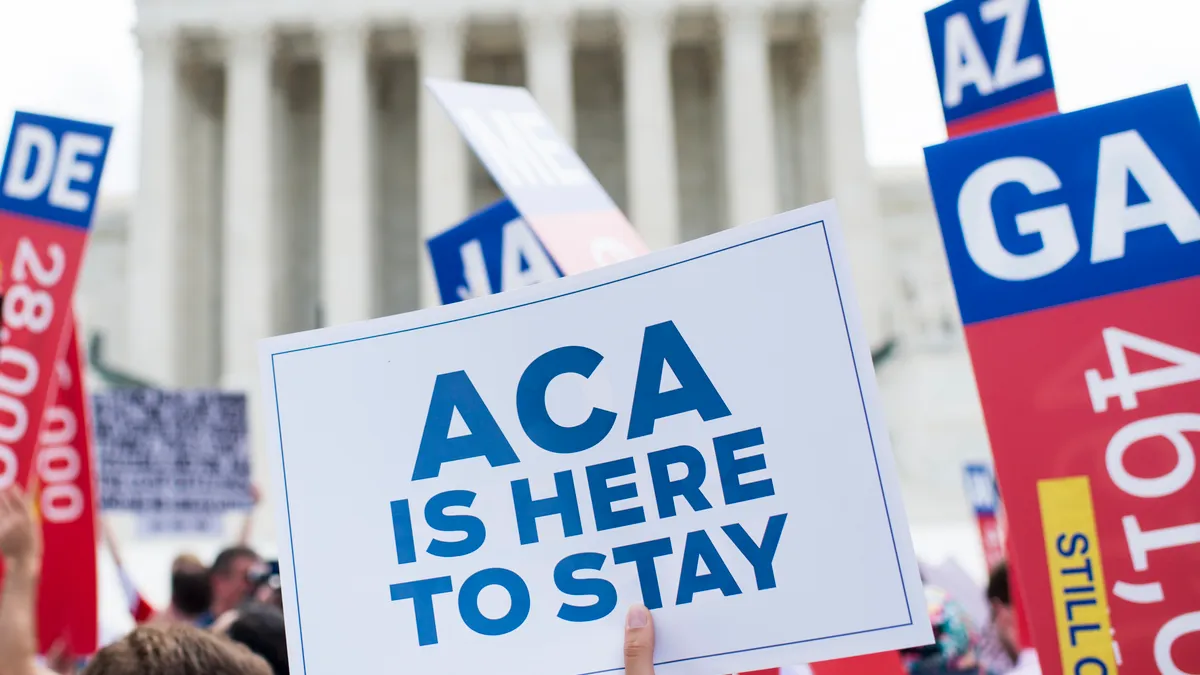The Supreme Court has closed the case on the latest legal challenge that threatened to overturn the Affordable Care Act. But experts say it's unlikely to mark the end of challenges targeted at some component of the decade-old law.
"I don't expect that we'll see more broadside challenges to the law as a whole. But we'll surely continue to see challenges to parts of Obamacare," Nicolas Bagley, a University of Michigan law professor who closely followed the case, said. He points to another Texas case seeking to undo the pieces of the law that require free access to preventive services and vaccines.
On Thursday, in a 7-2 decision, the high court upheld the ACA for the third time. The court reversed a lower court's decision that found what was once thought a key portion of the law — the individual mandate — was unconstitutional. The Supreme Court remanded the case, or sent it back down, with instructions to dismiss the case.
The key word may be dismiss. The case will now be tossed after the Supreme Court held the plaintiffs had no standing, or no right to bring the suit, a basic legal requirement in any piece of litigation.
The ruling is a "firm closing of the door," California Attorney General Rob Bonta argued to reporters Thursday. "It's clear. It's unequivocal. It is an order for a dismissal of this case. This case is over."
But on whether the latest ruling meant an end to future challenges, Bonta seemed skeptical. "I don't put it past them to come up with something," Bonta said, in perhaps a nod to a line of Republican efforts to roll back the ACA, including two previous suits that also made it up to the Supreme Court.
California was instrumental in defending the law. The Trump administration declined to defend the ACA in court from the suit helmed by a group of red states, and later two men from Texas with marketplace plans. Xavier Becerra, the prior California AG who led the defense for a group of blue states, is now President Joe Biden's secretary of HHS, the nation's top health regulator.
Thursday's ruling provides certainty in the near term, but it's not "necessarily the last word on the ACA’s constitutionality," an associate principal with Avalere, a healthcare consulting group, said.
"There are still other legal challenges that depending on how the arguments are framed, could have success with this Supreme Court," Avalere's Massey Whorley said, pointing to the same case Bagley, the law professor at Michigan mentioned, Kelley v. Becerra.
The issue, Massey told Healthcare Dive, is the court didn't get to the merits of the case. And while some proponents see that as a resounding victory, it could also leave an opportunity to go back to the drawing board. "In fact, [SCOTUS] took a few steps towards saying like, 'if you wanted to demonstrate standing, this is what you would do'," Massey said.
Republicans seemed reluctant to issue statements in the hours following the decision (and defeat). Texas, which led the challenge, has yet to release a statement on whether they'd consider a similar legal challenge down the road. Similarly, the attorney for the two men, who works out of the Texas Public Policy Foundation, also has yet to release a statement or respond to a request for comment hours after the decision was handed down.
However, Republican leaders quoted by The Hill appear to have conceded defeat, with Senator Roy Blunt, R-Mo., saying the law is firmly "baked" into the nation's healthcare system.
Still, Tom Price, the former HHS secretary under Donald Trump, did say a similar challenge is possible with the "appropriate plaintiff."
However, legal experts said today's ruling in particular should give future challengers pause.
"If others are tempted to like reinvigorate this challenge, a seven-to-two decision from a quite conservative Supreme Court should should put those efforts on ice," Katie Keith, a lawyer and health policy expert at Georgetown University, said.
The case marks the third time the Supreme Court has rescued the landmark health law, passed more than 10 years ago under President Barack Obama. The ACA scraped by in two prior suits ruled on by the Supreme Court in 2012 and 2015.
Thomas Barker, a partner at Foley Hoag and former acting general counsel for HHS and general counsel for CMS, said given those prior rulings, little room is left for future suits.
"It's hard for me to see what else could be challenged," Barker said.
And the law is now more popular than ever, according to the Kaiser Family Foundation polling. The ACA ushered in insurance coverage gains for millions of Americans, driving down the uninsured rate to record lows.
Biden, who was instrumental in the ACA's passage, said Thursday's decision was a win for the American people.
"With millions of people relying on the Affordable Care Act for coverage, it remains, as ever, a BFD. And it’s here to stay," Biden said.
BFD, of course, is a nod to when Biden himself was heard on a microphone whispering to then President Obama that its passage was a "big f------ deal" in 2010.
Obama also chimed in on Thursday's decision via Twitter: "This ruling reaffirms what we have long known to be true: the Affordable Care Act is here to stay."




















